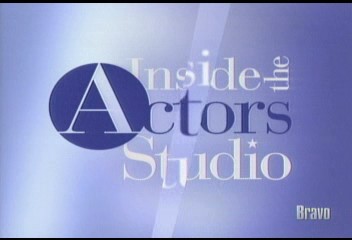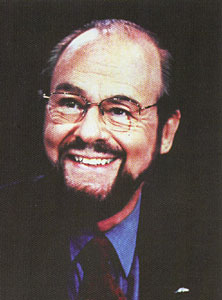Inside the Actors Studio

James Lipton: "Tonight, we have a special treat. One of the most important writers of the 21st century will be joining us to speak about his works from the written page, stage, small screen and film. He has written 6 books, for which he has earned numerous prizes including the Pulitzer, he has written 4 plays, for which he has earned a Tony Award, and he has written, directed and produced a variety of programs for television and film, garnering him Emmy Nominations, Ace Award Nominations, Golden Globe Nominations and Academy Award Nominations. Tonight, he will speak to us about his life and his inspirations. Ladies and gentleman, I am proud to introduce to the Actor's Studio...Joseph Carlos!!!"
THUNDEROUS APPLAUSE
JL: Joseph, welcome to the Inside the Actors Studio!
JC: Thanks James. May I call you James?
JL: Of course.
JC: Then thanks. My father, who is here tonight, and I used to watch this show before it became a cultural phenomenon. So, this means a great deal to me and my family.
JL: And it means a great deal to us.
JC: As well it should.
JL: 6 other graduates of Morehouse College have graced this stage as guests. Aside from Julliard and other schools whose main emphasis is the arts, Morehouse stands alone in producing the most guests on this program.
JC: (Interrupting) James, thanks for telling me something else I can brag about.
LAUGHTER
JL: Spike Lee, Samuel Jackson, Saul Williams, Jamal Dedeaux, George Peters, Kwaben Haffar and now you, Joseph Carlos...What is it that makes Morehouse special?
JC: How long is this show? Man...that's a tough one. I'd have to see that it's the cohesive nature that is naturally formed. We are an all-male, predominately African American institution, and that distinction brings us together in natural ways like you'd never know. I mean, 24 hours a day, as a student, you are seeing positive, accomplished, erudite, African American men, and you can't help but what to be a part of that positivity. I don't know what Spike and Sam said, but since George, Jamal and Kwabi are close, personal friends of mine, I can safely say that their opinion would be similar.
JL: At Morehouse, you were involved with everything.
JC: Yeah, I was. Well, I was an undergraduate student for 11 years.
JL: How did you manage that.
JC: It wasn't easy! No, I wasn't very focused on my academics obviously. I was more interested in learning the way that I wanted to. Eventually, my father and mother made it extremely evident that they could take no more of it, and put their feet down, and I buckled down and finished up my degree in Political Science.
JL: But you didn't even start at Morehouse, you started at Howard University in Washington, DC...
JC: You have good info on those blue cards. Yes, I did begin at HU. I was a film student there, but once again not serious about my studies.
JL: What were you serious about?
JC: Exploring DC and the eastern seabord. Reading books in the library. The NFL. Sega Genesis proficiency. The Howard co-eds. The normal things a freshman is concerned with.
JL: And all of these experiences helped you to write your wonderfully poignant collegiate memoir, "When I Was In College..."
APPLAUSE
JC: Yes. I was at Benihana in Atlanta, and a buddy of mine suggested that I write my collegiate story. Little beknownst to him that I had already started doing so, and the rest is history.
JL: Where did you get the title from?
JC: My friend John Cox. He figured that when I was telling stories about college, I would start off with that phrase, and it kind of stuck. My brother felt I should use a line from 'Gross Pointe Blank' in which Jeremy Piven says, "Ten years! Ten years? Ten years!" John's idea won out.
JL: Indeed it did. Was the book cathartic for you?
JC: Great question. You are so good at this. Yes, it was. No therapy in the world, and believe me, I've tried, could help me get over years of frustration like writing everything down. To me, the book is a history lesson, a cautionary tale, a commentary, a humor-filled, anecdoete laden opus-like love song to the late nineties and early 2000s.
(The music plays, and a scene from the HBO movie adaptation of the book plays)



0 Comments:
Post a Comment
<< Home